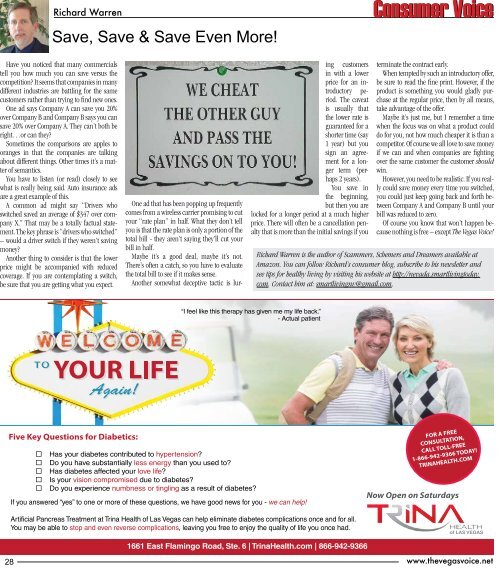Create successful ePaper yourself
Turn your PDF publications into a flip-book with our unique Google optimized e-Paper software.
Richard Warren<br />
Save, Save & Save Even More!<br />
Consumer Voice<br />
Have you noticed that many commercials<br />
tell you how much you can save versus the<br />
competition? It seems that companies in many<br />
different industries are battling for the same<br />
customers rather than trying to find new ones.<br />
One ad says Company A can save you 20%<br />
over Company B and Company B says you can<br />
save 20% over Company A. <strong>The</strong>y can’t both be<br />
right…or can they?<br />
Sometimes the comparisons are apples to<br />
oranges in that the companies are talking<br />
about different things. Other times it’s a matter<br />
of semantics.<br />
You have to listen (or read) closely to see<br />
what is really being said. Auto insurance ads<br />
are a great example of this.<br />
A common ad might say “Drivers who<br />
switched saved an average of $347 over company<br />
X.” That may be a totally factual statement.<br />
<strong>The</strong> key phrase is “drivers who switched”<br />
– would a driver switch if they weren’t saving<br />
money?<br />
Another thing to consider is that the lower<br />
price might be accompanied with reduced<br />
coverage. If you are contemplating a switch,<br />
be sure that you are getting what you expect.<br />
One ad that has been popping up frequently<br />
comes from a wireless carrier promising to cut<br />
your “rate plan” in half. What they don’t tell<br />
you is that the rate plan is only a portion of the<br />
total bill - they aren’t saying they’ll cut your<br />
bill in half.<br />
Maybe it’s a good deal, maybe it’s not.<br />
<strong>The</strong>re’s often a catch, so you have to evaluate<br />
the total bill to see if it makes sense.<br />
Another somewhat deceptive tactic is luring<br />
customers<br />
in with a lower<br />
price for an introductory<br />
period.<br />
<strong>The</strong> caveat<br />
is usually that<br />
the lower rate is<br />
guaranteed for a<br />
shorter time (say<br />
1 year) but you<br />
sign an agreement<br />
for a longer<br />
term (perhaps<br />
2 years).<br />
You save in<br />
the beginning,<br />
but then you are<br />
locked for a longer period at a much higher<br />
price. <strong>The</strong>re will often be a cancellation penalty<br />
that is more than the initial savings if you<br />
terminate the contract early.<br />
When tempted by such an introductory offer,<br />
be sure to read the fine print. However, if the<br />
product is something you would gladly purchase<br />
at the regular price, then by all means,<br />
take advantage of the offer.<br />
Maybe it’s just me, but I remember a time<br />
when the focus was on what a product could<br />
do for you, not how much cheaper it is than a<br />
competitor. Of course we all love to save money<br />
if we can and when companies are fighting<br />
over the same customer the customer should<br />
win.<br />
However, you need to be realistic. If you really<br />
could save money every time you switched,<br />
you could just keep going back and forth between<br />
Company A and Company B until your<br />
bill was reduced to zero.<br />
Of course you know that won’t happen because<br />
nothing is free – except <strong>The</strong> Vegas Voice!<br />
Richard Warren is the author of Scammers, Schemers and Dreamers available at<br />
Amazon. You can follow Richard’s consumer blog, subscribe to his newsletter and<br />
see tips for healthy living by visiting his website at http://nevada.smartlivingtoday.<br />
com. Contact him at: smartlivingnv@gmail.com.<br />
28 www.thevegasvoice.net


